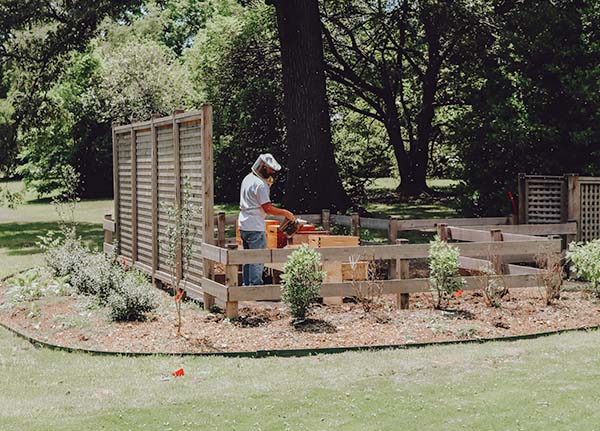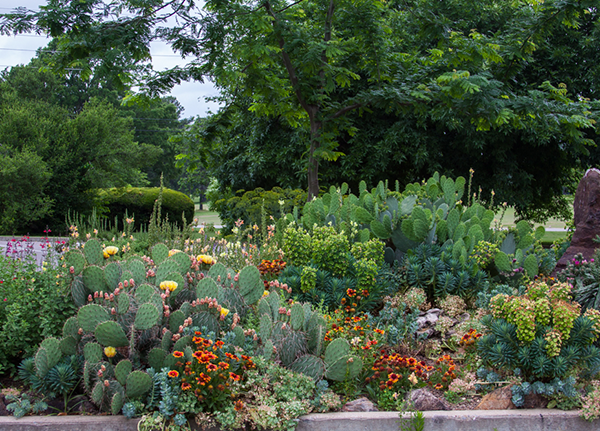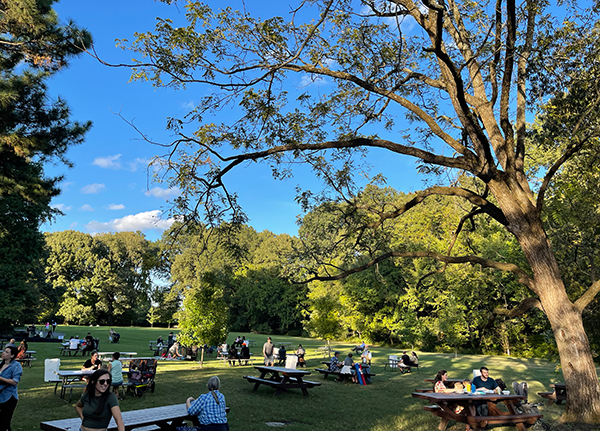Urban Home Garden
The emphasis is on addressing the particular challenges of creating a productive, inviting landscape in an urban environment.
The Urban Home Garden is a demonstration garden where both function and form are paramount. Simple solutions are shared but with the added intention of showcasing good design. A mixture of refined imagination mingles with what seasoned gardeners have done for generations in examples such as beds of heirloom vegetables trellised on inexpensive, yet aesthetically pleasing metal fencing and espaliered fruit trees creating a bountiful fenceline.
This educational space features examples of edible landscaping, perfect for small-space gardens, and tests new seed introductions in the raised beds. Not only is it valuable for us to know how to grow our own food, it is also equally important to see the full cycle of life—how a garden works. In The Coop, chickens process food scraps and, in turn, create manure compost to fertilize future vegetables. The Beekeeper’s Garden demonstrates what is needed for backyard beekeeping and highlights the importance of these pollinators and their role in food production.
Also in this corner of the Garden, you will find the original Arboretum plantings from the 1950s. The diverse collection features many trees suited for the home garden. The surrounding greenhouses are used to house tropical collections and to grow plants for our grounds and Nursery at the Garden sales. Beyond them, in the ‘desert-like’ environment of our parking lot, xeriscaped beds and a Desert Garden offer solutions for home landscaping in dry conditions.
As you discover this area, we hope you’re inspired to bring some of the ideas home with you. And be sure to stop by often as we try new solutions and techniques for every urban home gardener.

The Beekeeper’s
Garden
Bees are important to any garden as they pollinate flowers and encourage plant reproduction. Home beekeeping is a fun and worthwhile endeavor, but it takes planning. Things to consider before starting a hive is your willingness to commit time to your bees, the available space, the potential cost, and the local laws. In Memphis, all colonies must be registered with the Tennessee Department of Agriculture and also must be placed no closer than 15 feet away from any property line. It may feel overwhelming at first, but there are many online resources to help with starting your own hive.
Available flowers and climate both play a role in the taste and quality of honey produced. To make one pound of honey, bees must collect nectar from over a million flowers! Our hives are surrounded by Purple Coneflower, Summersweet Clethra, Winterberry Hollies, and other native plants selected to attract and support bees, who in turn support our garden by pollinating flowers throughout the 96 acres.

Desert
Garden
Memphis has high humidity and high average rainfall, making it nothing like a desert. That’s why this garden is in such an unlikely location: our parking lot! The soil has been amended with rock and sand for excellent drainage. Add the reflected heat from the pavement and we have a somewhat desert-like environment. The cacti, succulents, perennials, and grasses included in this collection make a great addition to any dry home landscape.
Plants that grow in desert conditions have unique characteristics: fat stems to store water, waxy, powdery, or fuzzy coatings to protect against the hot sun, and in some species, sharp spines instead of leaves to reduce water loss to the air. In this garden, you’ll see drought-tolerant plants that thrive in west Tennessee, including ground-covering sedums and upright, pointy-leaved yuccas. The striking silvery-blue Whale’s Tongue Century Plant (Agave ovatifolia), native to Mexico, is one of the most cold-hardy agaves known. The Prickly Pear Cactus (Opuntia) is a common sight in Mid-South gardens. Its large pads are a staple in Mexican cuisine and the purple fruit is often used to make drinks, candy, and jelly.

Hardwood
Picnic Grove
Loosely termed ‘hardwoods’, trees that produce flowers are classified botanically as angiosperms. Trees in this group differ from conifers (called ‘softwoods’), which produce cones. Generally, hardwood trees take longer to mature than conifers. Because they grow more slowly, they produce denser wood. Some species may take over 100 years to fully mature. Common hardwood species include oak, hickory, maple, beech, cherry, and ash. Around 40% of the trees in America are considered hardwoods.
Tennessee has 14 million acres of forestland, with many hardwoods scattered throughout the state. Memphis has been billed the Hardwood Capital of the World and is home to the National Hardwood Lumber Association. Because of their incredibly strong wood, hardwoods are often used as material for flooring, fences, boats, and outdoor decks.
Enjoy a picnic among this growing grove of shade trees made possible by the Knapp Foundation and other memorial and honorarium donations.
750 Cherry Road
Memphis, TN 38117
(901) 636-4100
Central Daylight Time Hours:
9 am-6 pm
Central Standard Time (Winter) Hours:
9 am-4:30 pm